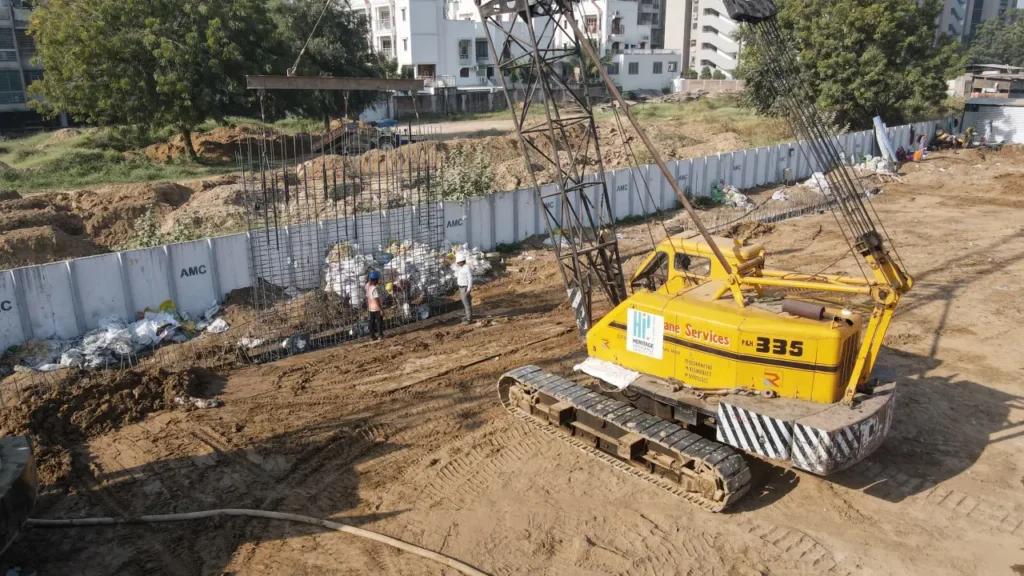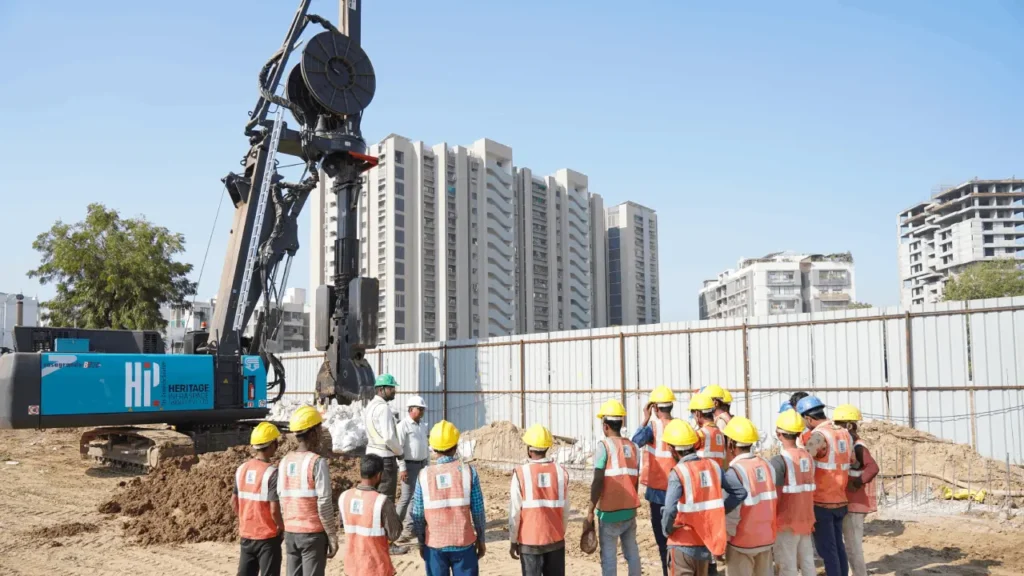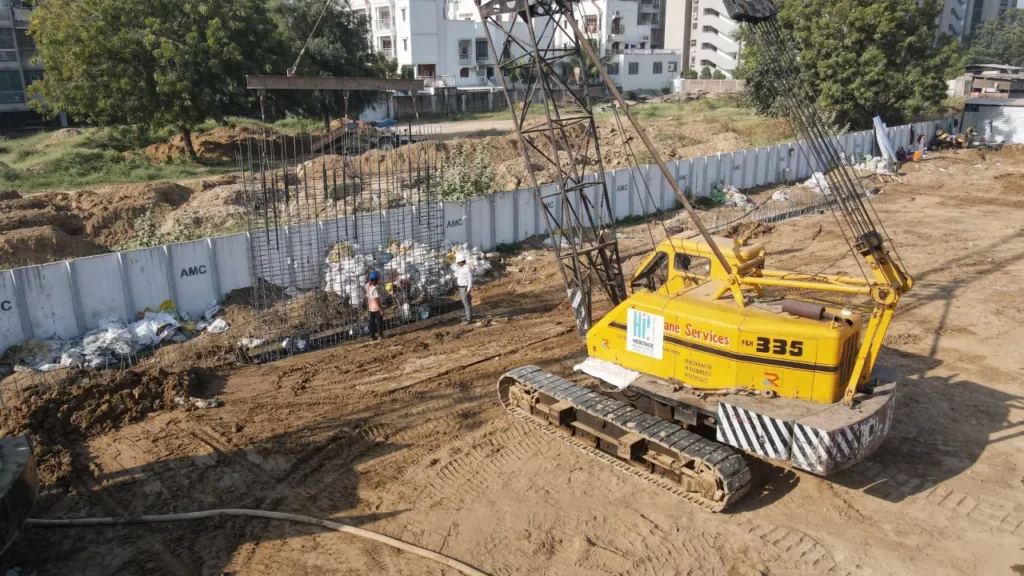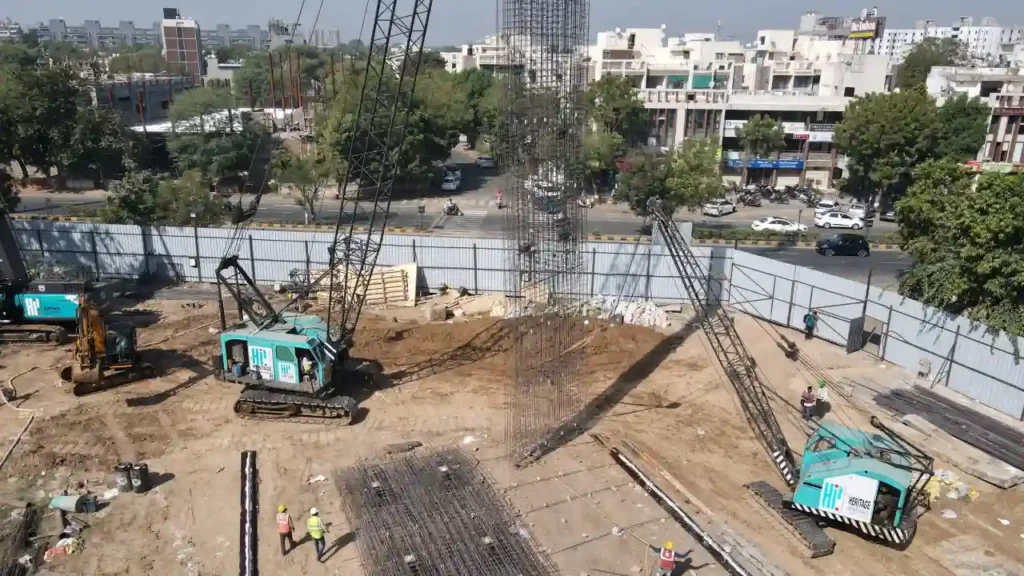Diaphragm wall construction is a vital aspect of building deep basements for modern commercial and residential structures. Diaphragm walls are reinforced concrete walls that are typically used for deep excavations, such as those required for the construction of underground structures like basements, subways and tunnels. These walls are designed to withstand the lateral and vertical pressures that arise from the excavation process and the weight of the surrounding soil.
As one of the leading diaphragm wall contractors in India, Heritage Infraspace India Ltd (HIPL) ensures that the construction process is carried out to the highest possible standards. We’re going to talk about quality control measures we take as responsible contractors for diaphragm wall construction and how they are crucial to ensuring the safety of the structures built atop.

HIPL’s own RMC plant used to source concrete for projects
Quality control measures by diaphragm wall contractors in India during the construction process
- Inspection of Materials: The first step in ensuring the quality of diaphragm wall construction is to carefully inspect the materials that will be used in the process. This includes the concrete mix, reinforcement, polymer slurry, etc which must meet certain specifications for strength, durability and viscosity.
- Testing of Materials: Once the materials have been inspected, they must be tested to ensure that they meet the required standards. This includes testing the strength of the concrete and the tensile strength of the reinforcement.
- Supervision during Construction: Throughout the construction process, diaphragm wall contractors in India must closely supervise the work being carried out to ensure that it is being done following the design and specifications.
- Regular Inspections: Regular inspections are carried out during the construction process to ensure that the diaphragm wall is being constructed to the required standards.
- Final Inspection: Once the diaphragm wall has been constructed, a final inspection is carried out to ensure that it meets all the requirements.
Ensuring the best quality in construction material
The below-listed tests are often conducted in combination with one another to ensure a comprehensive evaluation of the diaphragm wall’s strength and integrity.
- Crosshole sonic logging (CSL): This test measures the speed of sound waves transmitted between pairs of parallel tubes or access holes, which are typically drilled into the diaphragm wall after the concrete has been set. The results can reveal any defects or voids within the wall and provide an estimate of its compressive strength.
- Ultrasonic pulse velocity (UPV) testing: Similar to CSL, UPV measures the speed of sound waves transmitted through the concrete, but this test is conducted on the surface of the wall. The results can provide information on the overall quality of the concrete and detect any flaws that could reduce its strength.
- Core sampling: This involves drilling out cylindrical samples from the diaphragm wall, which are then tested in a laboratory to determine the compressive strength, density and other physical properties of the concrete.
- Rebound hammer testing: This is a non-destructive test that involves striking the surface of the wall with a specialised hammer and measuring the rebound force. The results can provide an estimate of the concrete’s compressive strength.
- Visual inspection: Engineers will visually inspect the diaphragm wall to identify any cracks, voids, or other defects that could impact its strength and integrity.
Testing the strength and integrity of diaphragm walls
To ensure the quality of the materials used in diaphragm wall construction, we as contractors for diaphragm wall construction take several measures, which include:
- Procurement from reliable sources: Materials such as concrete mix and reinforcement are procured from reliable sources to ensure that they meet the required standards. And when the site is in Ahmedabad or surrounding areas, we procure it from our own RMC plant.
- Testing: All materials are tested by our civil engineers before they are used in the construction process to ensure that they meet the necessary specifications.
- Monitoring: The usage of materials is monitored throughout the construction process to ensure that they are used in the pre-determined quantity and remain of the required quality.
Challenges faced by diaphragm wall contractors in India
Diaphragm wall contractors in India face several challenges in ensuring that the construction process meets the required standards. These challenges include:
Availability of Skilled Labour: One of the biggest challenges faced by diaphragm wall contractors in India is the availability of skilled labour. Since diaphragm wall construction requires specially trained workers, HIPL has its own team of ground workers who execute the projects.
Quality of Materials: Another challenge is ensuring that the materials used in the construction process meet the necessary standards. To ensure top quality, HIPL has constructed 2 state-of-the-art RMC plants in Gujarat to supply concrete to all of its projects.
Environmental Factors: Environmental factors such as soil conditions and weather can also pose challenges during the construction process. The team of contractors for diaphragm wall at HIPL always conducts its due diligence and soil testing before commencing work.

Construction workers overseeing the working of
equipment on site
Design considerations for diaphragm walls
The design of a diaphragm wall can significantly influence the quality control measures that need to be implemented during construction. Some important design considerations include:
- Depth of Excavation: The depth of excavation required for a diaphragm wall can influence the strength and stability of the wall. Contractors must carefully consider the soil conditions and other factors when determining the depth of excavation.
- Thickness and Reinforcement: The thickness and reinforcement of a diaphragm wall can significantly influence its strength and stability. Diaphragm wall construction companies in India ensure that the wall is designed to meet the necessary specifications.
- Sealing and Water-Tightness: Diaphragm walls are often used in areas where water ingress is a concern. Contractors for diaphragm wall carefully design and construct the wall to ensure that it is sealed and water-tight.

Ensuring design and construction quality on every diaphragm wall site
Documentation and Records
During the construction process, whether it is a diaphragm wall in a dam or metro construction in India, diaphragm wall contractors in India maintain detailed documentation and records to ensure quality control. This includes records of material testing, inspection reports and construction schedules. These documents are used to monitor progress, identify potential issues and ensure compliance with relevant standards and regulations.
In conclusion, HIPL’s diaphragm wall contractors in India play a crucial role in ensuring that diaphragm walls are constructed to the highest possible standards.
Implementing quality control measures throughout the construction process, ensuring the quality of materials used, testing the strength and integrity of diaphragm walls and overcoming challenges are all essential for successful diaphragm wall construction.
To know more about our projects, visit www.heritageconstruction.in or email us at info@oldheritage.4wheelsmediaworks.in








